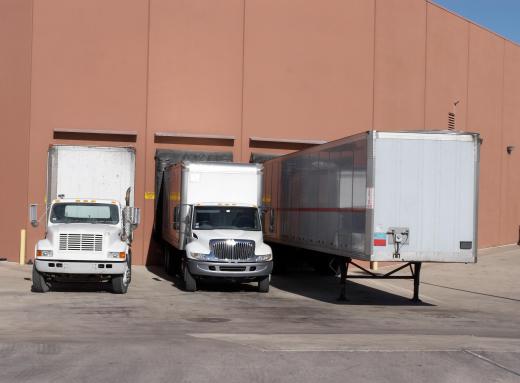A dock leveler is a piece of loading dock equipment that corrects for differences in height to facilitate smooth loading and unloading. Loading docks have a fixed height, and truck beds might vary in height depending on design and load. This can lead to a problem with cargo transfer. The leveler creates a gently inclined platform for equipment, allowing personnel to quickly transfer goods between the truck and loading dock with a minimum of safety risks. Usually, dock levelers are fixed in place at a loading dock, although mobile designs also are available.
These devices are sometimes known as dock plates or dock boards. A dock leveler consist of a heavy-duty platform mounted on a movable frame. It can angle up or down to reach the bed of a truck and lock in place. Equipment such as forklifts can be driven up the dock leveler and into the truck to collect or drop off supplies. When the job is finished and the truck leaves, the leveler can be brought back to a neutral position to wait for the next truck.

Several design considerations go into the development of a dock leveler. The first is weight tolerances. Equipment that is used to move cargo tends to be very heavy, and the cargo adds to the weight of the load. The device needs to be able to withstand very high weights without slipping or buckling. Very strong, durable metals usually are preferred for the surface and the supporting struts, especially because the leveler might be used numerous times each day.
Another issue is equipment handling. Forklifts, palette lifters and other lifting and moving trucks tend to handle poorly and slowly. They cannot safely navigate steep inclines. As a result, the dock leveler must be long so it can create a gentle angle, even when the height difference is significant. It might have a security device to prevent it from angling too steeply, or a company might have protocols to remind workers not to use extreme angles with the dock leveler.
Suppliers of dock leveling equipment might have machines available for rental to customers who want to try a device out before purchasing one, and some suppliers also sell refurbished equipment. The company can send a technician to install the device and train employees in safe, effective and appropriate use. It is important for a company to provide employees with clear safety training so that they know how to use the device and how to respond to an emergency. For safety reasons, the weight limits on the dock leveler should be posted in a highly visible location.
Ever since she began contributing to the site several years ago, Mary has embraced the exciting challenge of being a About Mechanics researcher and writer. Mary has a liberal arts degree from Goddard College and spends her free time reading, cooking, and exploring the great outdoors.

